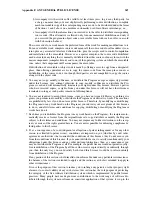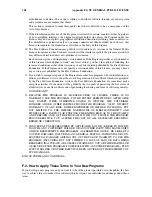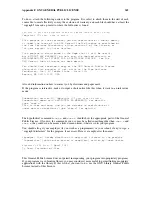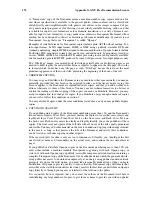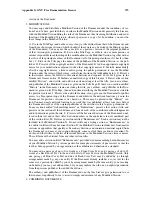
Index
381
C
++
compilers, (refer to Section 14.4.1.3
C++expressions
C
++
exception handling, (refer to Section 14.4.1.7
gdb features for C++
C
++
scope resolution, (refer to Section 10.2
Program
variables
C
++
symbol decoding style, (refer to Section 10.7
Print settings
C
++
symbol display, (refer to Section 14.4.1.7
gdb
features for C++
C-L, (refer to Section 24.2
TUI Key Bindings
C-o (operate-and-get-next),(refer to Section 5.1
Com-
mand syntax
C-x 1, (refer to Section 24.2
TUI Key Bindings
C-x 2, (refer to Section 24.2
TUI Key Bindings
C-x a, (refer to Section 24.2
TUI Key Bindings
C-x A, (refer to Section 24.2
TUI Key Bindings
C-x C-a, (refer to Section 24.2
TUI Key Bindings
C-x s, (refer to Section 24.2
TUI Key Bindings
call, (refer to Section 16.5
Calling program functions
call overloaded functions, (refer to Section 14.4.1.3
C++expressions
call stack, (refer to Chapter 8
Examining the Stack
calling functions, (refer to Section 16.5
Calling pro-
gram functions
calling make, (refer to Section 4.3
Shell commands
casts, to view memory, (refer to Section 10.1
Expres-
sions
catch, (refer to Section 7.1.3
Setting catchpoints
catch catch, (refer to Section 7.1.3
Setting catchpoints
catch exceptions, list active handlers, (refer to Section
8.4
Information about a frame
catch exec, (refer to Section 7.1.3
Setting catchpoints
catch fork, (refer to Section 7.1.3
Setting catchpoints
catch load, (refer to Section 7.1.3
Setting catchpoints
catch throw, (refer to Section 7.1.3
Setting catchpoints
catch unload, (refer to Section 7.1.3
Setting catch-
points
catch vfork, (refer to Section 7.1.3
Setting catchpoints
catchpoints, (refer to Section 7.1
Breakpoints, watch-
points, and catchpoints
catchpoints, setting, (refer to Section 7.1.3
Setting
catchpoints
cd, (refer to Section 6.5
Your program’s working di-
rectory
cdir, (refer to Section 9.4
Specifying source directories
character sets, (refer to Section 10.15
Character Sets
charset, (refer to Section 10.15
Character Sets
checks, range, (refer to Section 14.3.1
An overview of
type checking
checks, type, (refer to Section 14.3
Type and range
checking
checksum, for gdb remote, (refer to Section D.1
Overview
choosing target byte order, (refer to Section 18.3
Choosing target byte order
clear, (refer to Section 7.1.4
Deleting breakpoints
clear, and Objective-C, (refer to Section 14.4.2.1
Method Names in Commands
clearing breakpoints, watchpoints, catchpoints, (refer
to Section 7.1.4
Deleting breakpoints
close, file-i/o system call, (refer to Section D.7.10.2
close
collect (tracepoints), (refer to Section 12.1.4
Trace-
point Action Lists
collected data discarded, (refer to Section 12.1.6
Starting and Stopping Trace Experiment
colon, doubled as scope operator, (refer to Section
14.4.3.7
The scope operators
::
and
.
colon-colon, context for variables/functions, (refer to
Section 10.2
Program variables
command editing, (refer to Section 29.2.1
Readline
Bare Essentials
command files, (refer to Section 22.3
Command files
command hooks, (refer to Section 22.2
User-defined
command hooks
command interpreters, (refer to Chapter 23
Command
Interpreters
command line editing, (refer to Section 21.2
Com-
mand editing
commands, (refer to Section 7.1.7
Breakpoint com-
mand lists
commands, (refer to Section 27.6
Annotation for gdb
Input
commands for C
++
, (refer to Section 14.4.1.7
gdb
features for C++
commands to STDBUG (ST2000), (refer to Section
20.3.13
Tandem ST2000
comment, (refer to Section 5.1
Command syntax
comment-begin, (refer to Section 29.3.1
Readline Init
File Syntax
compatibility, gdb/mi and CLI, (refer to Section 26.5
gdb/mi Compatibility with CLI
compilation directory, (refer to Section 9.4
Specifying
source directories
compiling, on Sparclet, (refer to Section 20.3.11
Tsqware Sparclet
complete, (refer to Section 5.3
Getting help
completion, (refer to Section 5.2
Command comple-
tion
completion of quoted strings, (refer to Section 5.2
Command completion
completion-query-items, (refer to Section 29.3.1
Readline Init File Syntax
condition, (refer to Section 7.1.6
Break conditions
conditional breakpoints, (refer to Section 7.1.6
Break
conditions
configuring gdb, (refer to Appendix B
Installing gdb
configuring gdb, and source tree subdirectories, (refer
to Appendix B
Installing gdb
confirmation, (refer to Section 21.7
Optional warn-
ings and messages
Summary of Contents for ENTERPRISE LINUX 3 - SECURITY GUIDE
Page 1: ...Red Hat Enterprise Linux 3 Debugging with gdb ...
Page 12: ...2 Chapter 1 Debugging with gdb ...
Page 28: ...18 Chapter 4 Getting In and Out of gdb ...
Page 34: ...24 Chapter 5 gdb Commands ...
Page 44: ...34 Chapter 6 Running Programs Under gdb ...
Page 68: ...58 Chapter 8 Examining the Stack ...
Page 98: ...88 Chapter 10 Examining Data ...
Page 112: ...102 Chapter 12 Tracepoints ...
Page 118: ...108 Chapter 13 Debugging Programs That Use Overlays ...
Page 138: ...128 Chapter 14 Using gdb with Different Languages ...
Page 144: ...134 Chapter 15 Examining the Symbol Table ...
Page 170: ...160 Chapter 19 Debugging remote programs ...
Page 198: ...188 Chapter 21 Controlling gdb ...
Page 204: ...194 Chapter 22 Canned Sequences of Commands ...
Page 206: ...196 Chapter 23 Command Interpreters ...
Page 216: ...206 Chapter 25 Using gdb under gnu Emacs ...
Page 296: ...286 Chapter 27 gdb Annotations ...
Page 300: ...290 Chapter 28 Reporting Bugs in gdb ...
Page 322: ...312 Chapter 30 Using History Interactively ...
Page 362: ...352 Appendix D gdb Remote Serial Protocol ...
Page 380: ...370 Appendix F GNU GENERAL PUBLIC LICENSE ...
Page 386: ...376 Appendix G GNU Free Documentation License ...
Page 410: ......

